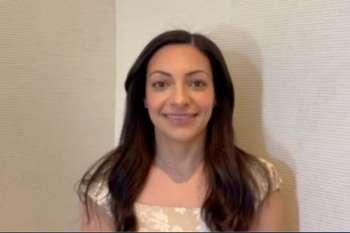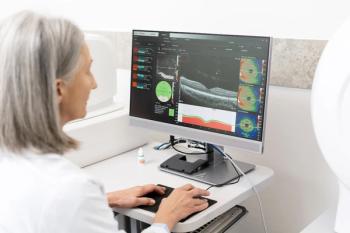
EnVision Summit 2024: Inside the new Optometry Program and glaucoma panel with Dr Danica Marrelli
The 2024 EnVision Summit will feature a brand-new Optometry Program, co-chaired by Danica Marrelli, OD, FAAO, AAO Dipl, and Cecelia Koetting, OD, FAAO, DipABO.
Danica Marrelli, OD, FAAO, AAO Dipl, sat down with Optometry Times to chat about the upcoming EnVision Summit 2024, which is set to take place February 16-19 in Puerto Rico. This year, the meeting includes an Optometry Program, which is chaired by Marrelli and Cecelia Koetting, OD, FAAO, DipABO. Marrelli discusses what optometrists can expect from the family-oriented meeting, from exciting geographic atrophy and glaucoma co-managment panels to a built-in kids track to keep loved ones engaged during CE sessions.
Video Transcript
Editor's note: This transcript has been lightly edited for clarity.
Emily Kaiser Maharjan:
Hi everyone, I'm here with Danica Marrelli, co-chair of the EnVision Summit Optometry Program, which is happening in Puerto Rico from February 16 through 19. Welcome, Dr Marrelli. I'm so glad you could join us.
Danica Marrelli, OD, FAAO, AAO Dipl:
Well, it's really a pleasure to be with you. Thank you.
Kaiser Maharjan:
Of course. So can you tell me a little bit more about what sets EnVision apart from other meetings?
Marrelli:
Well, I think there are a few things. I mean, first of all, Puerto Rico, who doesn't want to be there in the winter, right? It's a beautiful location at a beautiful resort.
But really, if you get to the meat of it, I think there aren't too many meetings that have ophthalmology and optometry programs where all participants can cross match and go to whatever sessions they want to. I think that's really neat; I think every time we do a program where the two professions come together, I think that both professions come away learning more about the other. So I think it's a really unique opportunity.
Kaiser Maharjan
Absolutely. I totally agree. I mean, it's eye care, right.
Marrelli:
That's right.
Kaiser Maharjan:
We don't have to separate it all along lines.
Marrelli:
Yeah, and the other thing I think that's really fun about EnVision is the the amount of thought that went into deciding that this is going to be a family friendly event, right, you can bring your kids. They let your kids come into the lectures if they want to. When I was talking to Bonnie Henderson about it, she said, "You know, think about the kids that may come in and just get inspired by seeing their mom up at the podium or seeing, you know, some other women in ophthalmology and optometry getting up and that might be a spark that that leads them into eye care or into some other profession where they can be a leader." I think it's really neat. I've never been to a meeting that we had that type of family involvement.
Kaiser Maharjan:
I think that is just the coolest thing to have that family element. It's awesome. What excites you in particular about the EnVision optometry program?
Marrelli:
Cecelia Koetting [OD, FAAO, DipABO] and I are the co-chairs of this program and it's always a little, you know, "How are we going to make this new and exciting." I think the fact that most of the speakers are going to be optometrists, and then we're going to bring in panels where we have ophthalmologists that weigh in, and I think having that perspective of not being lectured to by an ophthalmologist, but watching and seeing this collaboration between optometry and ophthalmology is really neat.
I've been communicating with one of the doctors on the retina panel, and he's just been great to say, "Oh, I love this question, this really is important. From an ophthalmologist, retinal specialist standpoint, I really want an opportunity to talk to the optometry audience about this." I hope it's really going to open people's eyes, so to speak, and encourage that co-management.
Kaiser Maharjan:
Yeah, absolutely. So you're also moderating a panel on co-managing geographic atrophy (GA) in glaucoma. Do you have any pearls that you'd like to share?
Marrelli:
Yeah, so I'll take the first one, that geographic atrophy. I'll be very frank, my primary interest is glaucoma. I do see a lot of retina patients, but not a lot of geographic atrophy patients. But certainly anyone who's been to [American] Academy [of Optometry annual meetings] or other large meetings, I mean, the buzz right now is all about geographic atrophy. For so long, we have had nothing substantial to offer our patients with GA. Now we have these two new drugs, but we're still learning how to use them. We can't send every geographic atrophy patient to the retinal specialist, and they don't want every geographic atrophy patient. So what I really hope we're going to be able to send participants home with is some real practical advice about when should you watch them as an optometrist, and at what point should you say, "I think you may benefit from one of these new medications?" because they're not going to be for everybody.
It's such a new and exciting area, and the other thing, we have Carolyn Majcher (OD). She's an optometrist who's now in Oklahoma, and she is really a whiz at what I would consider advanced [optical coherence tomography] OCT interpretation in retina. So as these drugs have become available, and we're looking more at GA as a treatable condition, it's really led to this uncovering of some new subtle things that we can look for in our OCTs, and I just can't think of a better person to talk about that than Carolyn. So I'm really looking forward to kind of the whole retina morning on Saturday morning, where we have hot topics in retina and then Carolyn's going to do a section on multimodal imaging, and then we're going to follow that up with how do we co manage these patients with our retinal specialist ophthalmology friends.
So the second topic is co-managing glaucoma. That's where my heart is. I've really been interested in glaucoma for more than 30 years that I've been practicing. So as we move into, I guess what I would call 21st century glaucoma care, we have so many different interventional modalities. So, yes, we're still going to use eyedrops, but we have so much new evidence about SLT [selective laser trabeculoplasty] from the LiGHT trial, and then we're going to talk about the COAST study, which is a completely different way of looking at SLT. We're going to talk about medication delivery, so not just the Latanoprost XR, which we've had for a few years, but the new Travoprost implant that's available.
So we're going to talk about a lot of new things. Of course, we're going to talk about MIGS [microinvasive glaucoma surgery], you can't really talk about glaucoma co-management without talking about MIGs. But I think we're really at a neat place in glaucoma care, where our tool box is really big and really full. I hope that optometrists who attend this program go home knowing or feeling more confident saying, "I can use more than just a prostaglandin, I have all these other things. When should I engage an ophthalmologist, a surgeon? When can I take care of them myself?" So I'm really, really looking forward to that. It's not very long, it's one hour, and I hope we can, you know, sort of pull everything together that I want to during that hour.
Kaiser Maharjan:
Yeah, that'll certainly be a challenging feat, but I believe in you.
Marrelli:
Thanks.
Kaiser Maharjan:
So do you have anything else that you'd like to share?
Marrelli:
I hope that participants are fully engaged in everything that the meeting has to offer. If you see a program, a lecture, a talk and the ophthalmology side, you just go to that side. Everybody can go to anything they want. We're going to be doing yoga in Puerto Rico. I can't wait.
I will say, one of my students, I teach at the University of Houston, College of Optometry and one of my students, she lives in America, but her family's from Puerto Rico. She said, "Oh, you're going to Puerto Rico," and she gave me all this long list of things to do. So I'm hoping to get away from the resort a little bit and just see a little bit of what Puerto Rico has to offer.
Kaiser Maharjan:
Of course, I mean, that's half the fun of going to a meeting is exploring the surroundings.
Marrelli
That's right.
Kaiser Maharjan:
Well, thank you so much for taking the time to chat about the EnVision summit with me, Dr. Marrelli, it's been an absolute pleasure.
Marrelli:
Good, thank you so much for having me.
Newsletter
Want more insights like this? Subscribe to Optometry Times and get clinical pearls and practice tips delivered straight to your inbox.




























